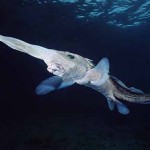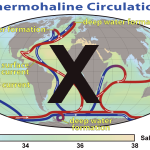
In May of 2008, I first reported on how the small Micronesian nation of Palau’s then President, Tommy Remengesau Jr., had signed into law the Protected Area Network (PAN) which endorsed and supported the Micronesia Challenge. The resulting law solidified Palau’s leadership and commitment to marine conservation since the declaration of the Micronesian Challenge and established financial provisions for funding the protected areas network.
Well, Palau is making global headlines again, and this time they have a partner on the other side of the planet.
Honduras and Palau, two countries that have stopped shark fishing in their waters through the creation of marine protected areas, are urging the rest of the world to conserve the world’s dwindling shark populations or run the risk of losing the ocean’s top predator and throwing the marine food chain out of balance.
To coincide with the High Level Plenary Meeting of the United Nations General Assembly to review the Millennium Development Goals, which include a target for preserving global biodiversity, President Johnson Toribiong of the Republic of Palau and President Porfirio Lobo Sosa of the Republic of Honduras issued a challenge to other world leaders to work together to save the world’s sharks. The two Presidents are calling on coastal countries to establish shark sanctuaries in their waters, where no shark fishing is permitted, and for all fishing countries to end shark finning and the global overfishing of sharks.
“We have done what we can in Palau’s waters to save these magnificent masters of the sea,” said President Toribiong of Palau, who announced the world’s first national shark sanctuary at the opening of the U.N. General Assembly session in 2009. “We have found that healthy shark populations keep our marine environment healthy and our tourism industry thriving. However, if unregulated overfishing of sharks throughout the world’s oceans continues, small island states such as ours will lose a vital resource, and the oceans on which our very lives depend will be irrevocably altered.”
“Our decision to protect sharks was made not just for this generation but for generations to come,” said President Lobo of Honduras, whose government announced a moratorium on all shark fishing in Honduran waters in February of this year. “The price of shark fins for the global trade drives fishermen to skirt or break limits on fishing and finning that would otherwise conserve shark populations. We call on other governments to join us in protecting sharks in their waters, for the sake of healthy coastal marine ecosystems and economic development.”
Of the 1,045 shark and ray species assessed by scientists for the International Union for Conservation of Nature (IUCN), 30 percent are threatened or near threatened with extinction. Further, for 47 percent of species, scientists lack enough data to properly assess their population status.
Up to 73 million sharks are killed annually to support the international shark-fin trade, a globally unregulated trade that is not sustainable. In general, sharks grow slowly, mature late and produce few young over long lifetimes, leaving them exceptionally vulnerable to overexploitation and slow to recover from depletion. As key predators, the health of entire ocean ecosystems is tied to their fate.
“Scientists have linked shark overfishing to imbalances in fish populations, the collapse of non-shark fisheries and the degradation of coral reefs,” said Joshua Reichert, Managing Director of the Pew Environment Group. “Palau and Honduras are global leaders in shark conservation and we call upon coastal nations and countries with large commercial fishing fleets to accept their challenge and take action.”
My takeaway from all of this? Something I’ve been saying for years: MPAs Work! Not just for coral reefs, but for fish too. But they don’t work magically through declarations on paper. They require active management. And management takes money.
Since intergovernmental bodies such as the Convention on International Trade of Endangered Species (CITES) gave one big middle finger to ocean health earlier this year, bold individual leadership is what’s needed.
The Presidents of Honduras and Palau are choosing to lead by example. It won’t be easy and it won’t be cheap. But it WILL be necessary.
Contacts:
Palau: Fermin Meriang; 212-813-0310, [email protected]
Honduras: Suyapa Carias; 212-752-3370, [email protected]
Pew Environment Group: Dan Klotz; 347-307-2866, [email protected]






I wish Australia would follow the wonderful example these two places have shown. I know where I will be spend my Holiday money
Ashley, that’s a great idea. We should encourage people planning tropical vacations to visit Honduras or Palau – and to tell them why. (Not that you’d need to twist my arm to go to Palau – wow, I wish I could.)
i agree… continued tourist dollars for those coastal or island nations can be a strong incentive for joining and actively managing their shark species… it can be some very compelling marketing advantages for an increasingly “green traveler” (however much i detest that label)…
but david over on southern fried science raises a valid point that sharks don’t observe mpa or national boundaries… where one nation may offer protected waters, their neighbors waters–which may be along shark migratory routes–are still open season…
not a perfect solution, but i think this is an important step in the right direction…
The analogy I like to use for creating marine protected areas for pelagics is how we create national wildlife refuges for birds. Birds can fly anywhere on the planet, but there are some places where they congregate, mate, and nest that are protected as wildlife refuges, state parks, national parks and a dozen other protected sites. For the most part, the oceans do no have analogous zones of varying protections. At the very least those places that sharks congregate, should be refuges. Also, sharks move away from fishing pressure and will eventually find the refuges (Didn’t you see Madagascar 2?). I agree that it is not an end all solution, but marine protected areas are a great place to start.
angelo: you mean there are sharks in madagascar 2?! i’m still trying to fathom the shadow ops penguins in madagascar 1…
Every cell in my body THANKS what you are trying to do .Swift and common sence. Is the only thing that will save Our Sharks. The world has gone mad. I am so glad to see a culture so advanced as this. God has blessed you country with what no one has anymore a leader with a brain and who thinks of the future. I bow before this monumental effert to counter mainstream stupidity. Save Our Sharks From a Bowl Of Soup. Denise Edgar